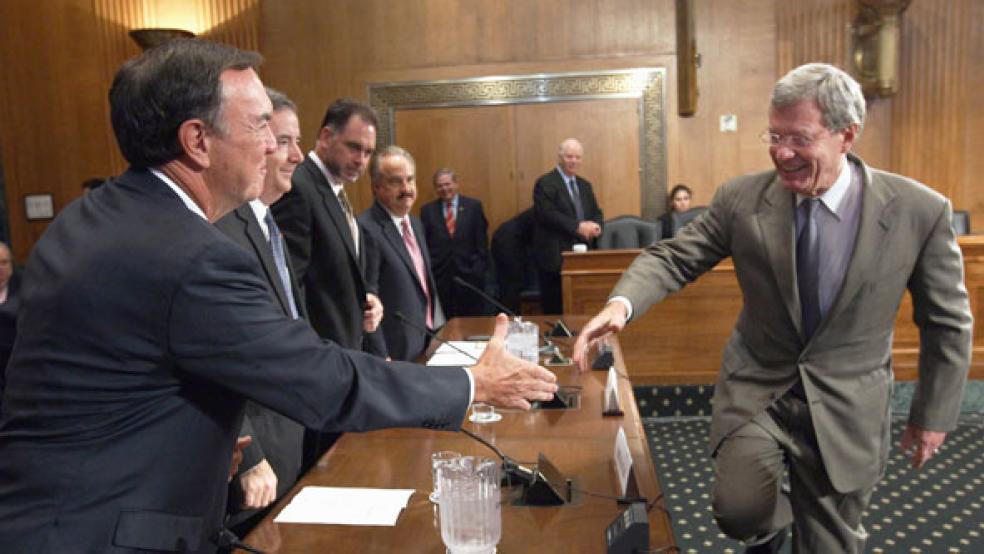Some of the nation’s most prominent CEOs told the Senate Finance Committee they would be willing to forsake some prized tax deductions and credits in exchange for a lower corporate tax rate and a shift to a “territorial” taxation system, in which profits are taxed in the country where they are earned.
“If it means a simplified, more competitive, territorial system, we will give up the existing incentives that benefit us,” said Michael T. Duke, CEO of Wal-Mart Stores. Kimberly-Clark CEO Thomas J. Falk, who noted that his company utilizes tax credits for research and development, manufacturing, and accelerated depreciation , said , “When it comes to making a choice between the marginal rate and an additional incentive package, I’d choose the lower rate and get rid of the incentives.”
The CEOs, who also included chief executives of CVS Caremark and semiconductor manufacturer PMC-Sierra, said these changes would entice them to boost their U.S. payrolls and repatriate foreign-earned profits they currently have stashed abroad.
The U.S. corporate tax rate is currently 35 percent—the second-highest among developed nations; Japan is first, with a 39.5 percent rate. The U.S. is the only G8 nation where companies are subject to what’s known as a worldwide tax system, with all income earned abroad and brought back into the U.S. taxed at the U.S. rate rather than the foreign rate.
“A reduction in the maximum corporate income tax rate would allow us to accelerate our investments in U.S. jobs, technology, and infrastructure,” said CVS Caremark CEO Larry J. Merlo. “Our high effective tax rate not only limits the amount of earnings available to us for reinvestment in our core business, it also makes CVS Caremark less attractive to global investors.”
Democrats and Republicans were skeptical that a simultaneous rate reduction, elimination of the deductions known as tax expenditures, and a shift to territoriality would stimulate prolonged business investment in the U.S. “My concern about a territorial system is that you’ll have lots of gaming, lots of transfer pricing, and especially, you’ll have more business overseas rather than more incentives for jobs in the United States,” said Sen. Ron Wyden, D-Ore. House Budget Chairman Kent Conrad, R –N.D., added that without a proper framework, there could be a situation similar to the 2004 repatriation holiday, when profits companies brought back into the U.S. were directed to shareholders instead of hiring and capital investment. The committee’s ranking member, Sen. Orrin Hatch, R-Utah, expressed concern that once the corporate rate came down and tax deductions were eliminated, the rate could then creep up again and businesses would no longer have the benefit of those credits to fall back on.
Democrats and Republicans for years have said they want to overhaul the dense and loophole-ridden U.S. tax code, which hasn’t been revised since 1986, when Ronald Reagan was president. President Obama has pushed tax reform as part of the debt ceiling debate, calling for elimination of certain tax breaks to couple with spending cuts Republicans insist on. The issue also has come up in several deficit-reduction proposals, including those from House Budget Committee Chairman Paul Ryan, R-Wis.; House Ways and Means Chairman Dave Camp, R-Mich.; the President’s Commission on Fiscal Responsibility; and the Bipartisan Policy Center. But there’s little likelihood that Republicans in Congress will accept any tax expenditure changes as part of a deal to lift the debt ceiling, leaving that and broader tax overhaul for the coming months and years.
“Tax reform itself is a multi-year conversation that really has yet to take hold,” Columbia Business School Dean Glenn Hubbard told The Fiscal Times yesterday. “The notion that Congress in a matter of weeks is going to rip up the whole tax code isn’t practical. It’s going to be a long slog.”


